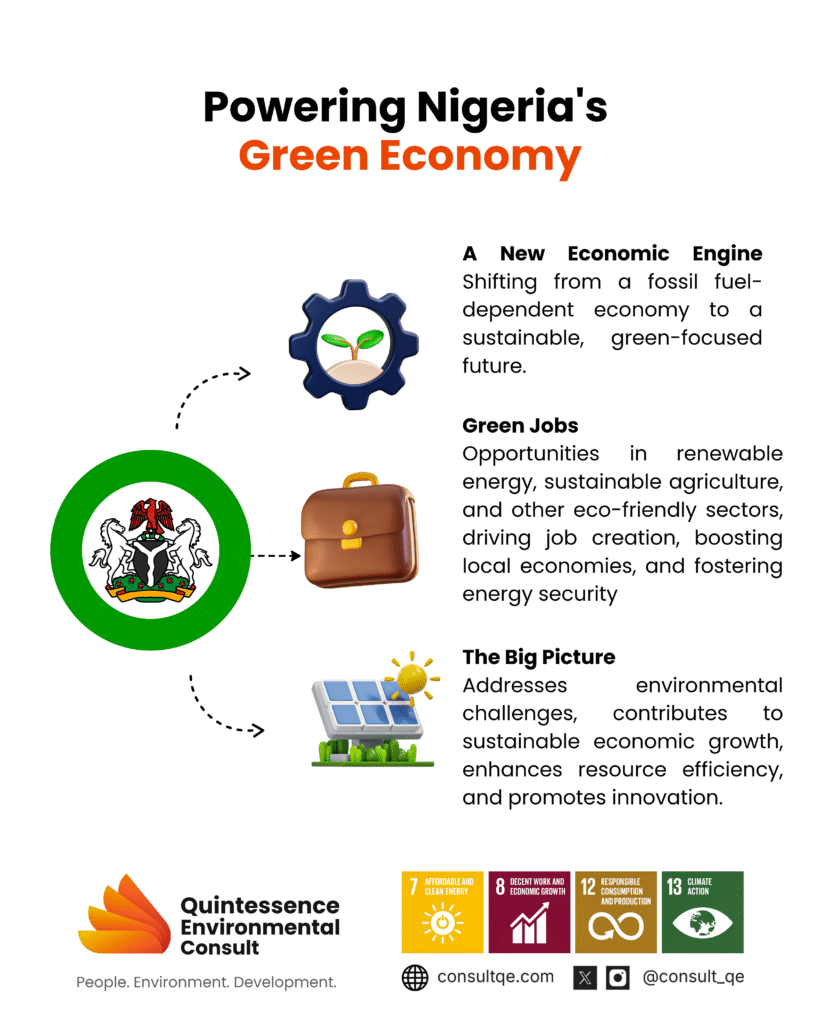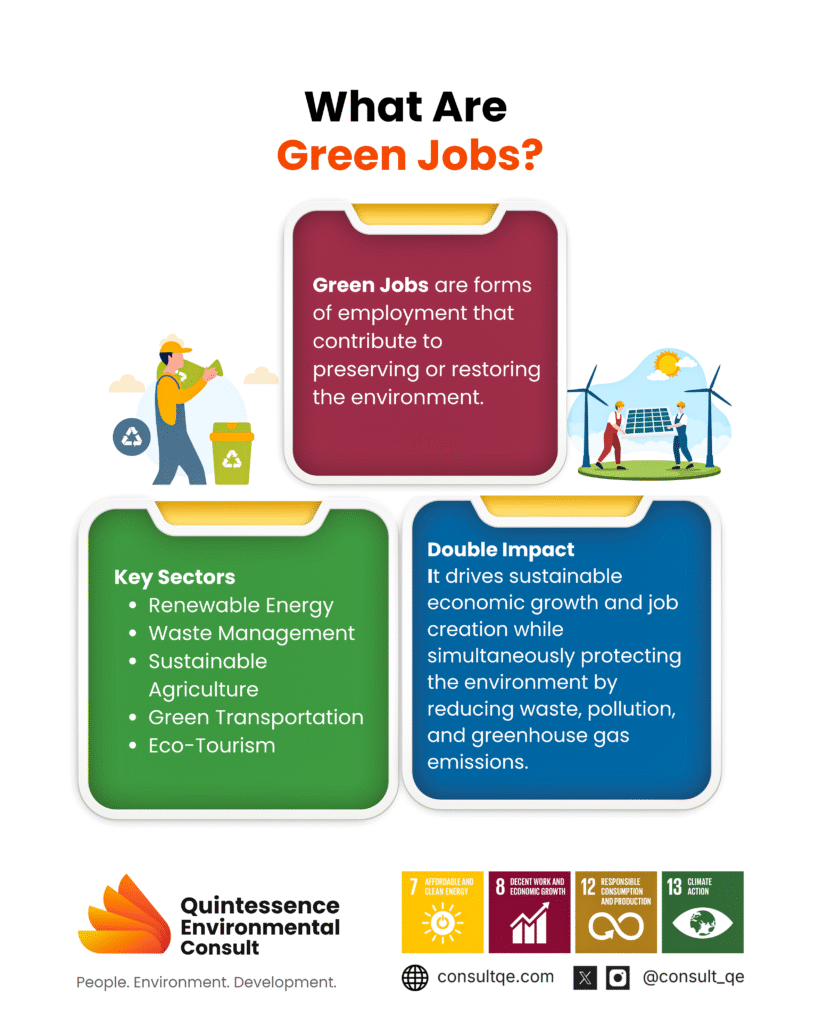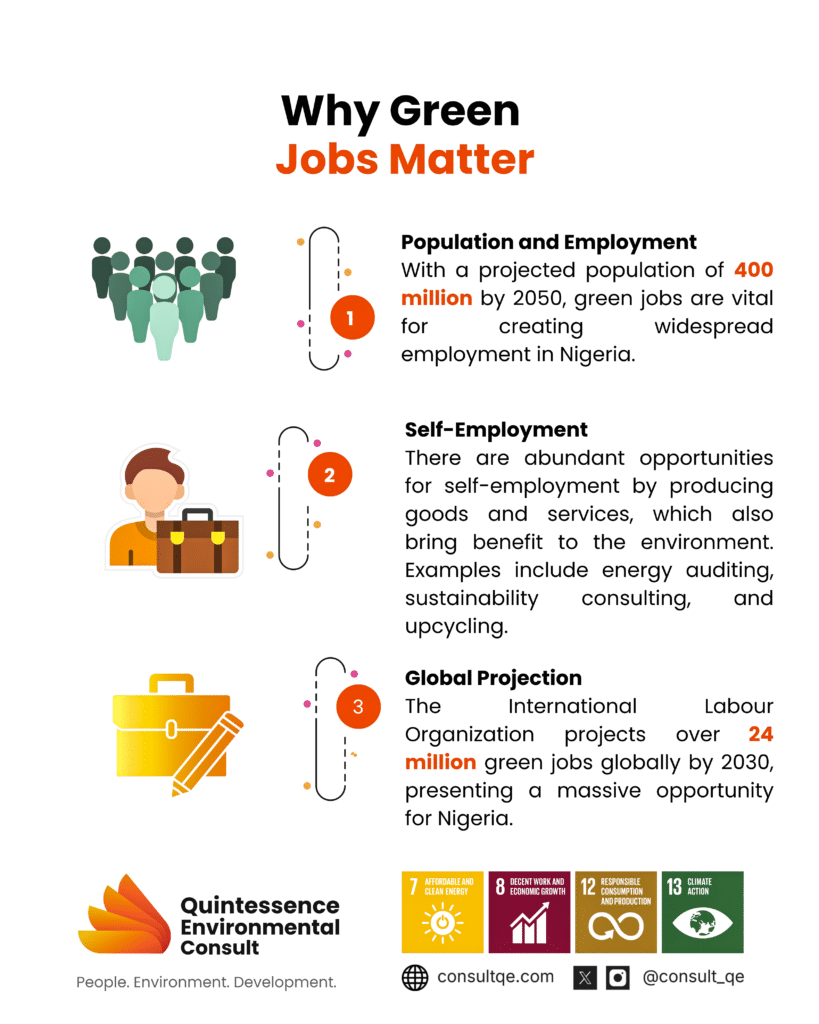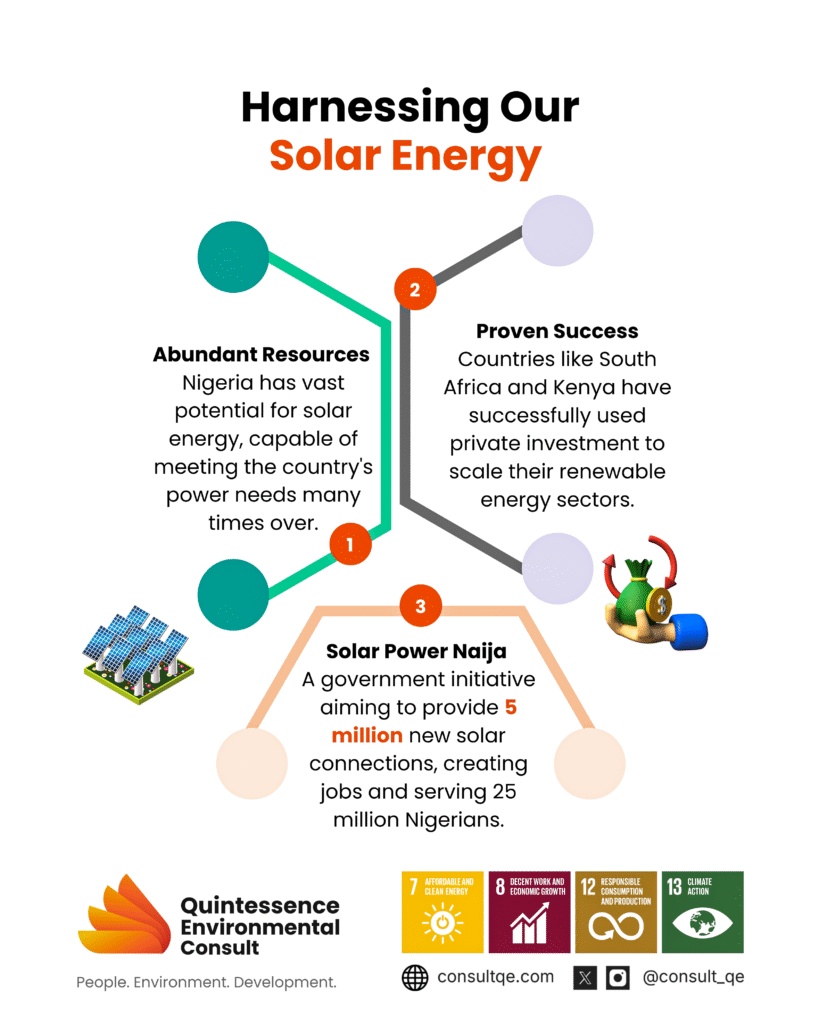KEY TAKEAWAYS
- With a population projected to reach 400 million by 2050, green jobs are vital; thus, Nigeria’s Energy Transition Plan aims to create 340,000 direct jobs by 2030.
- Nigeria’s long-standing reliance on crude oil makes its economy highly susceptible to global price shocks, contributing to the 2016 recession. This over-reliance has prevented the development of other vital sectors.
- The waste management industry is an underexplored goldmine, as Nigeria generates about 32 million tonnes of solid waste annually, through waste-to-energy and recycling.
- Challenges in advocating green jobs in Nigeria are inconsistent policies, inadequate infrastructure, limited access to affordable financing for green entrepreneurs, and a shortage of trained professionals and technicians.
- To actualize its full potential, the government should strengthen and align policy frameworks, invest in green infrastructure & education, and expand access to green finance.

INTRODUCTION
For decades, Nigeria’s economic narrative has been heavily reliant on the unstable nature of the oil market, as seen in the 2016 recession. (1) This dependency hinders the country’s capacity to develop other critical sectors, such as agriculture, manufacturing, and renewable energy. However, as the world shifts towards a sustainable future, transitioning to a green economy serves as an innovative pathway to enhancing the Nigerian economy. The transition to a green economy, a model that is low-carbon, resource-efficient, and socially inclusive, is not just about environmental protection; it is a strategic pathway to creating a new generation of employment opportunities known as green jobs.

WHAT ARE GREEN JOBS AND WHY DO THEY MATTER?
The projected population surge in Nigeria, potentially reaching 400 million by 2050, does present significant challenges, particularly in terms of resource management, infrastructure development, and social services. (2)Globally, the International Labour Organization (ILO) projects that the shift to a green economy could create over 24 million jobs by 2030 (3).
Green jobs refer to employment that contributes to preserving and restoring the environment, both in traditional sectors such as manufacturing and construction and new, emerging sectors such as renewable energy and energy efficiency. (4) Green jobs are designed to be environmentally friendly, economically viable, and socially inclusive. A green job can be self-employed to produce goods or provide services that benefit the environment, for example, energy auditing, consulting services, and upcycling.

- Renewable Energy: This sector involves the design, manufacturing, installation, and maintenance of clean energy systems. Jobs include solar panel technicians, wind turbine engineers, off-grid energy project managers, and biofuel production specialists. The renewable energy potential, especially in solar, is immense. Nigeria’s Energy Transition Plan, which targets 30% renewable energy generation by 2030, could create 340,000 direct jobs by 2030 and up to 840,000 by 2060. Countries like South Africa and Kenya have successfully used private investment to scale their renewable energy sectors. (8).
- Sustainable Agriculture: These jobs focus on producing food in an environmentally friendly way. Examples include agronomists specializing in climate-resilient crops, organic farming specialists, and technicians who install and maintain solar-powered irrigation systems.
- Waste Management and Recycling: As Nigeria generates approximately 32 million tonnes of solid waste annually (10), with Lagos alone producing over 13,000 tonnes per day (9), this sector offers immense potential. Green jobs here include waste sorters, recycling plant operators, waste-to-energy technicians, and managers for community-based recycling programs. Organizations like Wecyclers are transforming waste into wealth in Lagos, providing both jobs and cleaner environments. Similarly, sustainable fashion brands are using recycled materials to create eco-friendly products, gaining traction in local and international markets.
- Eco-tourism and Conservation: These roles preserve natural ecosystems while creating local economic value. Jobs range from park rangers and environmental educators to tour guides for eco-tourism ventures in national parks and game reserves.
- Green Building and Construction: This involves designing and constructing energy-efficient and environmentally responsible buildings. Examples include green building architects, sustainability consultants, and technicians who install energy-efficient lighting and cooling systems.
These green jobs not only provide income but also help combat climate change and biodiversity loss. In a country like Nigeria, which is already experiencing the impacts of desertification, flooding, and erosion, this is particularly important. If these grassroots efforts are scaled through supportive policies, incentives, and infrastructure development, the green economy could become a cornerstone of Nigeria’s diversification strategy.

CHALLENGES IN GREEN JOB IMPLEMENTATION IN NIGERIA
- Policy and Regulatory Inconsistencies: A key challenge for Nigeria’s environmental and energy policies, such as the National Renewable Energy and Energy Efficiency Policy (NREEEP), is the fragmented nature of their implementation (11).
- Inadequate Infrastructure: The country faces infrastructural gaps, particularly in reliable energy access, transportation, and waste management, which limit the deployment and scalability of green solutions, especially in rural areas. (7)
- Limited Access to Green Financing: Entrepreneurs and SMEs in the green sector struggle to access affordable capital. High interest rates and a lack of awareness among traditional financial institutions about the profitability of green ventures act as significant barriers. (6).
- Skills and Education Gaps: There is a shortage of trained professionals and technicians with skills specific to green industries—such as solar panel installation, eco‑agriculture, or environmental engineering—according to the International Labour Organization (13).
- Public Awareness Deficit: Many Nigerians are not yet aware of green career pathways or the economic and health benefits of transitioning to a low-carbon economy, limiting participation and support.
- Strengthen and Align Policy Frameworks: The federal and state governments should harmonize and enforce policies that promote green sectors, such as offering tax incentives for green businesses and large investments in green industries such as Renewable Energy, Sustainable Agriculture and Manufacturing.
- Invest in Green Infrastructure: Public and Private investments in off-grid renewable energy systems, recycling plants, green transport, and digital infrastructure will catalyse job creation while improving national productivity.
- Expand Access to Green Finance: Establishing green investment banks or funds can help SMEs and startups access affordable capital. Banks should be encouraged to create special loan packages for green enterprises.
- Develop Green Skills and Training Programs: Education and vocational institutions should integrate green skills into their curriculum. Public-private partnerships can also help train youth and reskill workers transitioning from the oil sector.
- Promote Public Awareness Campaigns: Media, non-governmental organizations (NGOs), and educational institutions should run nationwide campaigns highlighting the benefits of green jobs and how individuals can access them, encouraging widespread community participation.
By implementing these recommendations, Nigeria can effectively harness the economic, environmental, and social benefits that green jobs offer, laying the groundwork for inclusive and sustainable growth.
CONCLUSION
The transition to a green economy represents a transformative opportunity for Nigeria to move beyond its reliance on the unstable nature of the oil market. By strategically investing in green jobs, from renewable energy to waste management, the country can simultaneously address its unemployment crisis, achieve economic diversification, and build resilience against climate change. While significant challenges like inconsistent policies and a lack of green financing must be overcome, proactive measures such as strengthening policy frameworks and developing a skilled workforce can pave the way. Ultimately, embracing the green economy isn’t just an environmental choice for Nigeria; it is a critical step toward securing a prosperous and sustainable future for current and future generations.
- Anyaogu, I. (2025, August 4). Nigeria’s July oil output tops 1.8 million bpd, regulator says. Reuters. Retrieved August 6, 2025, from https://www.reuters.com/business/ energy/nigerias-july-oil-output- tops-18-million-bpd-regulator-says-2025-08-04/
- Federal Ministry of Finance and Budget and Planning. (2023, February 3). United Nations Population Fund Country Programme Document for Nigeria. UNFPA Nigeria. Retrieved August 6, 2025, from https://nigeria.unfpa.org/en/ publications/united-nations-population-fund-country-programme-document-nigeria
- Green growth. (n.d.). Wikipedia the Free Encyclopedia. Retrieved August 6, 2025, from https://en.wikipedia.org/wiki/Green_growth
- International Labour Organization (ILO). (2018). World Employment Social Outlook 2018: Greening with jobs. Retrieved from https://www.ilo.org/publications/world-employment-and-social-outlook-2018-greening-jobs
- International Renewable Energy Agency (IRENA). (2021). Renewable Energy and Jobs – Annual Review 2021. Retrieved from https://www.irena.org/publications/ 2021/Oct/Renewable-Energy-and-Jobs-Annual-Review-2021
- IRENA goes beyond the talk to address financing challenges in developing countries. (2022, July 21). IRENA. Retrieved August 6, 2025, from https://www.irena.org/News/articles/ 2022/Jul/IRENA-Goes-Beyond-the-Talk-to-Address-Financing-Challenges-in-Developing-Countries
- Jaiyesimi, F. (2025, May 22). Poor infrastructure deepens Nigeria’s food insecurity – World Bank. Business Day. Retrieved August 6, 2025, from https://businessday.ng/news/article/poor-infrastructure-deepens-nigerias-food-insecurity-world-bank/
- Kalu, N. (2025, July 25). Reps to introduce green jobs bill, target women, youth. The Nation. Retrieved August 6, 2025, from https://thenationonlineng.net/reps-to-introduce-green-jobs-bill-target-women-youth/
- NAN. (2025, April 1). Lagos generates 13,000 tonnes of waste daily – official. The Guardian. Retrieved August 6, 2025, from https://guardian.ng/news/nigeria/metro/lagos-generates-13000-tonnes-of-waste-daily-official/
- Ogundeji, J. (2025, May 26). Nigeria generates 32m tonnes waste annually, says Commissioner. Punch. Retrieved August 6, 2025, from https://punchng.com/nigeria-generates-32m-tonnes-waste-annually-says-commissioner/
- Okhirebhu, D., Johnson, O., Oluwasola, M., & Agboola, P. (2025). Overcoming Policy and Regulatory Barriers: Accelerating Nigeria’s Transition to Renewable Energy. IIARD International Journal of Geography & Environmental Management, 11(2), 88–108. https://doi.org/10.56201/ijgem
- PricewaterhouseCoopers (PwC) Nigeria. (2022). The Future of Nigeria’s Renewable Energy Sector. Retrieved from https://www.pwc.com/ng/en/publications/ future-of-renewable-energy-in-nigeria.html
- Strietska-Ilina, O., Hofmann, C., Durán Haro, M., & Jeon, S. (2010). SKILLS FOR GREEN JOBS A GLOBAL VIEW: SYNTHESIS REPORT BASED ON 21 COUNTRY STUDIES. International Labour Office. Retrieved August 6, 2025, from https://www.ilo.org/sites/default/files/wcmsp5/ groups/public/%40dgreports/%40dcomm/%40publ/ documents/ publication/wcms_159585.pdf
- World Bank. (2023). Nigeria Economic Outlook. Retrieved from https://www.worldbank.org/en
/country/nigeria/overview
